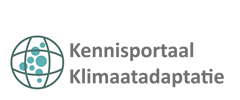Weert/Nederweert climate stress test
The municipalities of Weert and Nederweert are faced with the developments entailed in climate change. The impact was experienced, for example, in the summer of 2016, when the municipalities were affected by huge waterlogging. In order to gain more insight into the consequences of climate change, and into the potential risks and opportunities, the municipalities have conducted a stress test in collaboration with Sweco engineering consultants and the Climate Adaptation Services (CAS) foundation. The stress test has been conducted within the context of a pilot project initiated under the Delta Plan for the Elevated Sandy Soils of the province of Limburg.
Process
The stress test has been conducted in accordance with the step-by-step plan set out in the Guide to implementing stress tests. The main steps involved the compilation and analysis of data using a Climate Impact Atlas, and the organisation of a climate workshop to explore potential measures.
Climate Impact Atlas
The first step of the stress test, following the start of the project, involved mapping out the vulnerabilities. Several stakeholders have provided information on climate effects; this information has been analysed in collaboration with participants and area managing bodies.
The municipalities intended to use the stress test to raise awareness of the impact of climate change among administrators, government bodies, and residents. Another aim of the stress test was to gain insight into locations prone to waterlogging, as input for restructuring projects (e.g., public gardens). For that reason, the authorities opted for compiling the climate effects into a Climate Impact Atlas. This Atlas has been presented in a story map format.
The story map is a digital instrument that tells the story of the impact of climate change at the local level, based on maps. The information presented is selected in such a manner as to rapidly provide insight into the main effects, without getting bogged down into a great deal of technical details. The Climate Impact Atlas has been compiled on the basis of information made available by the Peel and Meuse Valley district water board, the municipalities of Weert and Nederweert, data from the national Climate Impact Atlas, and the data portal of the province of Limburg.
Climate workshop
The climate workshop was intended to identify measures that will render the municipalities of Weert and Nederweert less vulnerable to the impact of climate change. Representatives from the spatial, green, and water domains were involved in the workshop, as were housing corporations.
The focus of the workshop was thinking in terms of opportunities. A clever combination of functions will create new opportunities. By reference to the basic information provided in the Climate Impact Atlas, the participants collectively came up with solutions. A sketching session supervised by a landscape architect generated new solutions. In the workshop, a distinction was made between low-hanging fruit and more challenging projects.
Follow-up actions
Based on the results of the exploratory study, opportunities for large-scale disconnection opportunities in the urban outskirts of Weert will be explored, in combination with embellishing the transitional zone between the city and the countryside. An old brook course on the outskirts of a village centre will be transformed into a retention area with recreational facilities. In addition, opportunities for disconnection will be explored in restructuring projects.
Contact person
Werner Mentens
Gemeente Weert
w.mentens@weert.nl
0495 - 575353
